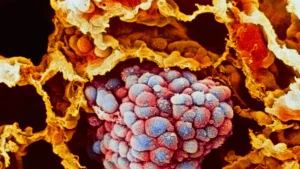Medications for Small Cell Lung Cancer
Small cell lung cancer (SCLC) is an aggressive form of lung cancer that requires immediate treatment. Medications play a crucial role in combating the disease and achieving positive outcomes. The goal of these medications is to kill cancer cells, shrink tumors, and prevent the cancer from spreading to other parts of the body. This article explores the main medications used in the treatment of SCLC and their impact on patients.

Goal of Medications
The primary objective of medications for small cell lung cancer is to eradicate cancer cells and control tumor growth. These medications may be used alone or in combination with other treatments like surgery or radiation therapy. They are designed to target specific processes within cancer cells, preventing their growth and division. Ultimately, the goal is to prolong survival, improve quality of life, and potentially achieve remission in some cases.
Etoposide
Etoposide is a chemotherapy drug commonly used in the treatment of small cell lung cancer. It works by preventing cancer cells from dividing and growing. Typically, etoposide is administered intravenously in combination with other chemotherapy drugs. Despite its side effects such as nausea, hair loss, and lowered blood cell counts, etoposide has shown significant efficacy in SCLC treatment, particularly when combined with platinum agents.
Cisplatin
Cisplatin is a platinum-based chemotherapy drug that is often used alongside etoposide for small cell lung cancer treatment. It interferes with cancer cell DNA, causing damage and inhibiting cell growth. Cisplatin is administered intravenously and may have side effects like kidney damage, hearing loss, and neuropathy. Nonetheless, it has proven effective in shrinking tumors and improving survival rates, especially when combined with other medications.
Carboplatin
Similar to cisplatin, carboplatin is a platinum-based chemotherapy drug commonly used for SCLC treatment. It is an alternative to cisplatin when the latter is not well-tolerated by patients. Carboplatin has a milder side effect profile, although it may still cause issues like low blood cell counts and kidney problems. Like other platinum agents, it works by interfering with DNA inside cancer cells, impairing their ability to grow and divide.
Irinotecan
Irinotecan is a topoisomerase inhibitor that can be used alone or in combination with other chemotherapy drugs for small cell lung cancer treatment. By inhibiting the function of topoisomerase, a protein involved in DNA replication and repair, irinotecan prevents cancer cells from dividing and spreading. It is generally administered intravenously and may have side effects like diarrhea, nausea, and lowered blood counts.
Atezolizumab
Atezolizumab is a immunotherapy medication known as a checkpoint inhibitor, frequently used in the treatment of small cell lung cancer. It works by targeting the programmed death-ligand 1 (PD-L1) protein, which is present on some cancer cells. By blocking the interaction between PD-L1 and its receptor, atezolizumab boosts the body’s immune response against cancer cells. Potential side effects include fatigue, rash, and autoimmune reactions. Atezolizumab may be used in combination with chemotherapy to improve treatment outcomes.
Durvalumab
Durvalumab is another immunotherapy medication used for the treatment of small cell lung cancer. It specifically targets the programmed death-ligand 1 (PD-L1) protein, similar to atezolizumab. By inhibiting the interaction between PD-L1 and its receptor, durvalumab helps the immune system recognize and attack cancer cells. Common side effects include fatigue, cough, and inflammation of the lungs. Durvalumab is often given after initial chemotherapy treatment to prevent cancer recurrence.
Other Treatments
In addition to medications, other treatments may be recommended for small cell lung cancer. These include radiation therapy, surgery, and palliative care. Radiation therapy uses high-energy beams to target and destroy cancer cells, either to shrink tumors before surgery or as a primary treatment option. Surgery involves removing the tumor and surrounding tissue from the lungs. Palliative care focuses on improving quality of life by managing symptoms and providing support to patients and their families.
Outlook
The prognosis for small cell lung cancer remains challenging, as it is often diagnosed at an advanced stage. However, advancements in treatment options, including targeted medications and immunotherapy, have shown promising results in improving outcomes. Research continues to explore new medications and combination therapies to enhance treatment efficacy. Early detection, proper management, and personalized treatment plans offer the best chance for a positive outlook.
Summary
Medications play a crucial role in the treatment of small cell lung cancer by targeting cancer cells and controlling tumor growth. Etoposide and platinum agents like cisplatin and carboplatin are commonly used chemotherapy drugs. Irinotecan, a topoisomerase inhibitor, can also be utilized. Immunotherapy medications like atezolizumab and durvalumab target specific proteins to enhance the immune system’s response to cancer cells. Other treatments such as radiation therapy, surgery, and palliative care may also be employed. While the prognosis for small cell lung cancer remains challenging, advances in medication and treatment options offer hope for improved outcomes and increased survival rates.